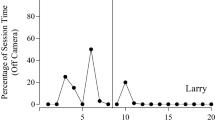Abstract
The number of BACB-accredited distance education programs is increasing, potentially bringing remote supervision into greater demand. Videoconferencing programs like Skype™ represent one avenue for remote supervision. The current study compares the effects of covert observations, in vivo observations, and observations using the Skype™ program on treatment integrity in three therapists working with children diagnosed with autism. The results show that the level of treatment integrity is comparable in both the in vivo and Skype™ conditions, both of which are superior to the covert observation condition.

Similar content being viewed by others
References
Brackett, L., Reid, D. H., & Green, C. W. (2007). Effects of reactivity to observations on staff performance. Journal of Applied Behavior Analysis, 40, 191–195.
Frieder, J. E., Peterson, S. M., Woodward, J., Crane, J., & Garner, M. (2009). Teleconsultation in school settings: linking classroom teachers and behavior analysists through web-based technology. Behavior Analysis in Practice, 2(2), 32–39.
Kazdin, A. E. (1977). Artifact, bias, and complexity of assessment: the ABCs of reliability. Journal of Applied Behavior Analysis, 10, 141–150.
Kazdin, A. E. (1979). Unobtrusive measures in behavioral assessment. Journal of Applied Behavior Analysis, 12, 713–724.
Lee, J. F., Schieltz, K. M., Suess, A. N., Wacker, D. P., Romani, P. W., Lindgreb, S. D., Kopelman, T. G., & Padilla Dalmau, Y. C. (2015). Guidelines for developing telehealth services and troubleshooting problems with telehealth technology when coaching parents to conduct functional analyses and functional communication training in their homes. Behavior Analysis in Practice.
Legal and Regulatory Affairs Staff. (2014). Practitioner pointer: does the use of Skype raise HIPAA compliance issues? Retrieved from www.apapracticecentral.org/update/2014/04-24/skype-hipaa.aspx.
Machalicek, W., O’Reilly, M. F., Chan, J., Lang, R., Rispoli, M., Davis, T., et al. (2009). Using videoconferencing to conduct functional analysis of challenging behavior and develop classroom behavior support plans for students with autism. Education and Training in Developmental Disabilities, 44, 207–217.
Nigro-Bruzzi, D., & Sturmey, P. (2010). The effects of behavioral skills training on mand training by staff and unprompted vocal mands by children. Journal of Applied Behavior Analysis, 43, 757–761.
Shore, B. A., Iwata, B. A., Vollmer, T. R., Lerman, D. C., & Zarcone, J. R. (1995). Pyramidal staff training in the extension of treatment for severe behavior disorders. Journal of Applied Behavior Analysis, 28, 323–332.
Wacker, D. P., Lee, J. F., Dalmau, Y. C. P., Kopelman, T. G., Lindgren, S. D., Kuhle, J., Pelzel, S. D., Schieltz, K. M., & Waldron, D. B. (2013). Conducting functional communication training via telehealth to reduce the problem behavior of young children with autism. Journal of Developmental and Physical Disabilities, 25(1), 35–48.
Author information
Authors and Affiliations
Corresponding author
Additional information
• Skype™ videoconferencing software maybe an effective tool for remote supervision.
• Real-time supervision using Skype™ software maintains treatment integrity in therapists as high as that observed during in vivo observations and higher than that observed during covert observations.
• Skype™ videoconferencing software is an affordable and effective option, making it an accessible option to many types of providers.
• Programs that offer online and long-distance supervision may benefit from conducting real-time supervision using Skype™ videoconferencing software.
Rights and permissions
About this article
Cite this article
Pantermuehl, R.M., Lechago, S.A. A Comparison of Feedback Provided In Vivo Versus an Online Platform on the Treatment Integrity of Staff Working with Children with Autism. Behav Analysis Practice 8, 219–222 (2015). https://doi.org/10.1007/s40617-015-0059-y
Published:
Issue Date:
DOI: https://doi.org/10.1007/s40617-015-0059-y




